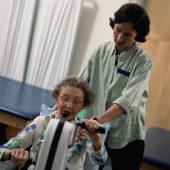New Guideline Urges Screening for Fall Risk
Those with poor balance, dementia, vision loss most in peril, group says.
|
E-mail this article
Subscribe to news
Printer friendly version
|

(SOURCE: American Academy of Neurology, news release, Feb. 4, 2008)
MONDAY, Feb. 4 (HealthDay News) -- Certain people are at high risk for accidental falls and should be regularly screened to help reduce the high number of fall-related injuries and deaths in the United States, a new guideline says.
Each year in the United States, accidental falls result in 1.8 million emergency room visits and more than 16,000 deaths.
The new guideline, issued by the American Academy of Neurology, take into account all available scientific studies and concluded that people with stroke, dementia, and walking and balance disorders have the greatest risk of falling. Having fallen in the past year strongly predicts that a person will suffer another fall, and people with Parkinson's disease, peripheral neuropathy, weakness in the legs or feet, and substantial vision loss are also at increased risk for falls.
The new guideline recommends doctors routinely ask patients about falls and use screening measures and mobility tests to assess whether a person is a risk of falling and needs prevention measures, such as starting a regular exercise program or eliminating fall hazards from their home.
The new guideline is published in the Feb. 5 issue of Neurology.
"There is a lack of awareness among doctors and patients in recognizing and preventing falls, which can lead to hip fractures, head injury, hospitalization and in some cases death," guideline lead author Dr. David J. Thurman, of the National Center for Chronic Disease Prevention and Health Promotion at the Centers for Disease Control and Prevention, said in a prepared statement.
"People need to know that falls are preventable, and there are simple tests to determine if you're at risk of falling," Thurman said. "Oftentimes the doctor may not ask about falls, and the patient may not mention falls. But, it's important to discuss falls, since some people can face serious life consequences after falling, such as disability and loss of independence, which may be averted only through fall prevention."
More information
The American Academy of Orthopaedic Surgeons has more about falls. 
Copyright © 2008 ScoutNews, LLC. All rights reserved. 
HealthDayNews articles are derived from various sources and do not reflect federal policy. healthfinder.gov does not endorse opinions, products, or services that may appear in news stories. For more information on health topics in the news, visit the healthfinder.gov health library.